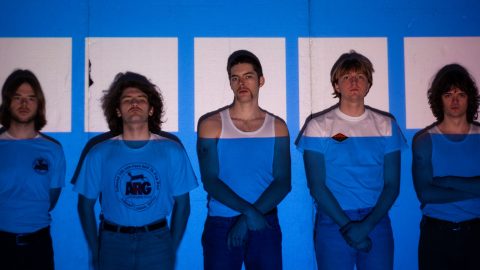
A few months ago, Lauren Auder temporarily lost the use of her legs. When two discs slipped out of her spine and pinched a nerve, the London-based singer was left unable to walk for a month. Yet she couldn’t help but feel she’d somehow conjured the injury into being. The British-French songwriter’s debut album, ‘The Infinite Spine’ (out July 21), is rife with such corporeal, medical imagery, directly tackling the pain and pressure of existing encased inside a physical form.
“I have this huge scar on my back,” Auder says, lifting her white vest top to reveal a raised dark pink mark in the middle of her lower back. “It’s funny how it comes together this way because it was all very much part of the aesthetics and the lexicon of the album. That’s the thing with making sigils in these big works,” she jokes as we find a sun-dappled bench in Stoke Newington’s Abney Park, the cemetery she frequents most days to think, write and connect with nature.
That Auder spends so much time in this dramatic Victorian setting feels fitting. The 24-year-old has cut her teeth across three EPs crafting majestic orchestral pop evoking the classical splendour of Moses Sumney, the rich baritone of King Krule and Lana Del Rey’s dark romanticism, music that feels tailor-made for such darkly divine environments. Auder says the trees and dogs, rather than any gloomy reflections on mortality, are what keep her coming back, but themes of death, ageing and spirituality have seeped into her first album by osmosis.
The record opens with a brave declaration of vulnerability on ‘33 & Golden.’ “I was born an open wound that only suicide could sew up,” Auder intones, her rich baritone vocals foregrounding an ominous wind section. Starting in the pits of darkness, the album slowly unfurls into the light before looping back around on itself, an infinite cycle of regression and regrowth. Suicidal fantasies eventually give way to the assertion that we’re “all needed here,” that “time heals me and therefore will heal others.”
As a self-described “album purist”, Auder wanted to take the listener on a journey that mirrors the second coming-of-age we experience in early adulthood. “I hope that listening to [‘The Infinite Spine’] feels like digging yourself out of a hole,” she says. There’s a trail of symbols to encourage exploration beyond the record’s twelve tracks, details inspired by the Auder’s own omnivorous hunger for information, cultivated during an adolescence spent online. “I’m very much a blog scourer and these are the kinds of things that I know would make me feel excited and feel a part of something if I were to find it.”
A significant part of the album’s narrative arc relates to the dark history at the heart of Auder’s French hometown. Growing up surrounded by the sprawling, Gothic architecture of the medieval town of Albi, Auder spent most of her teenage years “doing stupid shit” or, like many singer-songwriters coming of age around this time, scrolling through Tumblr and discovering Soundcloud rappers. But the town’s mystical aura inevitably found its way into her first album.
Albi was home to the Cathars, one of the earliest European religious sects to be culled by the Catholic Church. Members were burnt at the stake or led into the fire because they didn’t believe the Earth was created by a true God. Instead, they imagined humans to be angels that had been cast out of heaven by a demon and encased in human bodies. They held a nihilistic acceptance that everything happening on earth is bad by design and therefore suffering was inevitable.
This idea feels pertinent to the visceral themes and physical awareness of existing in a body that Auder explores on ‘The Infinite Spine.’ Flesh and bones can soon feel horrifying if we dwell on their physicality for too long. While it’s possible to draw parallels between the record’s discussion of the body and the beliefs of the Cathars, ultimately, Auder’s outlook is more hopeful.
“The Cathars had this acceptance of defeat and that life is gonna be shit,” she explains, pinching a cigarette between her fingers. “I’ve seen similar sentiments in people around me and myself. The message with this record was that I understand this feeling, but that’s no way to live. I say this without any judgement because it’s a feeling that I have been a victim of and I’m sure I’ve perpetuated it when being grumpy at a bar.”

Auder is instead interested in the meaning she can gather from knowing people and being known. It’s an experience she feels isn’t always afforded to people in the public eye, especially when they are objectified or reduced to something symbolic. On ‘118madonna’, the album’s second track, a rousing chorus name drops Britney Spears and JonBenét Ramsay, the child beauty queen who was murdered aged six. Both of these women represent the tragedy of trauma being turned into a narrative to dissect for public consumption.
“That’s often the only way we have to interpret celebrities and victims of huge tragedies,” Auder notes, staring at the headstones in front of us as she ponders this. “I think about it all the time, especially when we’re talking about transness and what it means to embody a woman because these symbols of femininity themselves have been diluted and dissected and refracted through the hellscape that is being in the public eye.”
In 2020, Auder came out as transgender. Her experience of navigating the world as a trans woman is implicit in the record, whether she’s addressing these feminine archetypes or crafting powerful rallying cries she hopes other trans women will connect with.
“Things have got pretty fucking bad in the public space for trans people,” Auder says carefully. “We tried to integrate in a way that confirmed to cis expectations and that was clearly a failed mission.” She pauses, measuring her words. “This is a difficult thing to say because it’s really scary and dark, but there’s hope in that. There’s a freeing notion in knowing that it was never about fitting in. It makes me want to double down on being true to myself because there’s no other way.”
This thread of hope runs through the record like arteries pumping blood straight to the heart. While some tracks are dark in their lyrics, they’re translated as joyous pop songs that come to life in choruses that ring out like incantations. “It’s a rallying cry to self-define,” says Auder. “Specifically for trans women, but also for anyone who’s felt objectified or reduced to a symbol.”

As she carves out her own roadmap for the future, Auder is stepping into herself. She’s set to tour the album this autumn, with shows at the Courtyard Theatre in London and Boule Noire in Paris already announced. There is pain existing in a body, something Auder is well aware of following her recent back surgery, but there’s ecstasy in it too. It means we can physically stand together, move our bodies to music, hear twigs crunch underfoot in a cemetery on a sunny day.
“Darker things are easier to dwell on,” Auder concludes as we weave our way out of the graveyard. “When you’re actually enjoying the world, you just enjoy the world, but I want to try and find that space and community where you can connect more deeply over a joyous thing. The truth to the faith is the faith itself. That’s where the record ends.”
Lauren Auder’s debut album ‘The Infinite Spine’ will be released on July 21 via True Panther Records
The post On her remarkable debut album, Lauren Auder finds hope in the darkness appeared first on NME.




